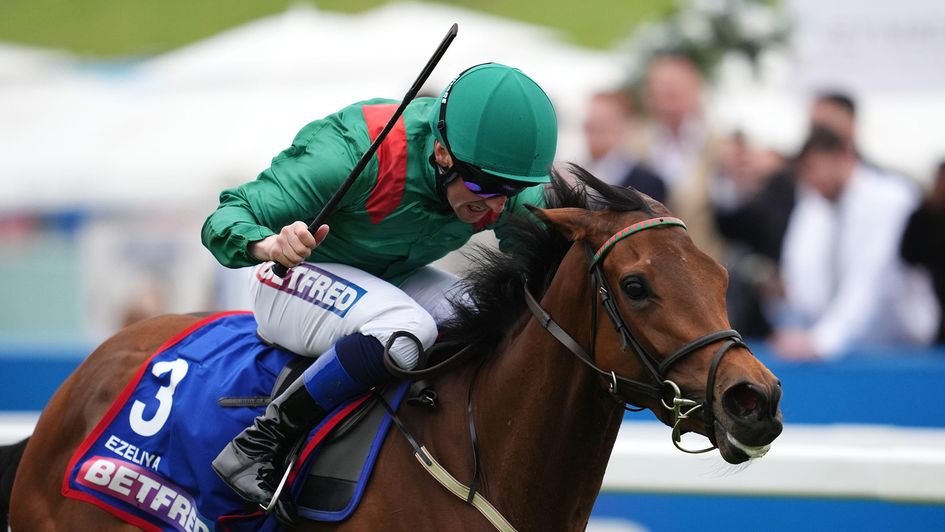John Ingles profiles the Epsom fortunes of the connections of Oaks winner Ezeliya dating back to Shergar and Blue Wind in 1981.
Epsom’s 1981 Derby meeting was a significant one for two of the most successful and enduring names in Flat racing. The Aga Khan won the Derby for the first time with his outstanding colt Shergar, ridden by Walter Swinburn and, three days later, Lester Piggott provided his young Irish trainer Dermot Weld with his first classic winner when winning the Oaks on Blue Wind. The jockeys concerned may be no longer be with us but, 43 years later, the Aga Khan and Dermot Weld enjoyed classic success at Epsom again this year, not separately this time but jointly thanks to Oaks winner Ezeliya.

Unlimited Replays
of all UK and Irish races with our Race Replays
Discover Sporting Life Plus Benefits

Trained by Sir Michael Stoute, Shergar’s ten-length victory remains a Derby record and, among Derby winners since, only Sea The Stars has matched his Timeform rating of 140. Sadly though, the ill-fated Shergar became a household name for more than just his exploits on the track after his subsequent kidnap at stud, but what about the Oaks winner that same year?
Although not quite rivalling Shergar’s winning margin, Blue Wind’s Oaks had much in common with his Derby – most of the field were beaten before the straight, she could be named the winner a long way from home and she won by a margin rarely seen in a classic – seven lengths, with a further ten back to the third. Runner-up Madam Gay won the Prix de Diane eight days later before finishing second to Shergar in the King George VI and Queen Elizabeth Stakes and as Timeform reported in her Racehorses essay that year ‘there was even speculation, unreal though it now sounds, that Blue Wind might be capable of beating Shergar.’
The Oaks and Derby winners were never to meet, though they added to their respective Epsom classic victories by winning the equivalent races at the Curragh. Both had different jockeys this time. Piggott took the ride on Shergar in the Irish Derby with Walter Swinburn suspended, while Swinburn’s father Wally, who was Weld’s stable jockey, gained some compensation for losing the winning ride to Piggott on Blue Wind at Epsom by partnering her to victory in the Irish Oaks.
Blue Wind, who had been beaten a short head in the Irish 1000 Guineas, didn’t perform to the same level in her two starts in the autumn, finishing fourth in the Joe McGrath Memorial Stakes (nowadays the Irish Champion Stakes) at Leopardstown and then down the field in the Arc, and she was then campaigned unsuccessfully at four in America, but not many Oaks winners since have earned a higher rating than the 127 she achieved at Epsom.
Blue Wind was therefore Weld’s first classic winner in both Britain and Ireland. His total of Irish classic victories (including the Irish St Leger) now stands at 21, while Ezeliya was his fourth such winner in Britain after Refuse To Bend, in the 2000 Guineas in 2003, and the Aga Khan’s Harzand in the 2016 Derby.
Until Willie Mullins overtook him as recently as this year’s Punchestown Festival, Weld had trained more winners than anyone in Ireland. But it’s fair to say that Weld’s 4000+ victories include a greater variety of winners, from the dual success of Committed in the Prix de l’Abbaye to Irish Grand National winner Perris Valley. That variety extends to his international spread of winners. Weld has said that he decided to start looking at races further afield after finding it hard to beat Vincent O’Brien in the major races closer to home, though little did he know he’d have another O’Brien as his nemesis later in his career.
Having been successful on all the other racing continents, Weld once had ambitions to train a winner on African soil too, but even if he never achieves that, he remains the only European trainer to have won a US triple crown race through Go And Go who won the Belmont Stakes in 1990. Others have followed since, but Weld also pioneered successful raids on Hong Kong, where Additional Risk was successful in 1991, and, more famously, on the Melbourne Cup which he first won with Vintage Crop 1993, followed by Refuse To Bend’s half-brother Media Puzzle in 2002.
Winning that Derby with Harzand in just his third season training for the Aga Khan must also rank highly among Weld’s achievements, and while Harzand went on to win a third Irish Derby for his trainer, like Blue Wind, he ended the season with lesser efforts in the Irish Champion Stakes and the Arc. A win in Europe’s most prestigious race is one of the few things missing from Weld’s CV but perhaps Ezeliya will be given her chance to put that right in the autumn.
Weld’s raids on Epsom’s classics have been very selective, and between the victories of Harzand and Ezeliya he had run only two other horses in either the Derby or Oaks. Hazapour, who was out of a half-sister to Harzand, finished fifth in the Derby two years after his relative won it, while Tarnawa finished down the field in the 2019 Oaks after winning the Blue Wind Stakes, the Oaks trial at Naas named after Weld’s 1981 winner. Tarnawa later developed into a high-class filly, winning the Prix Vermeille, Prix de l’Opera and Breeders’ Cup Turf at four and going close to providing her trainer with that elusive Arc success when runner-up in 2021, having also finished second in the Irish Champion Stakes.
Harzand was the present Aga Khan’s fifth winner of the Derby which equalled the number of Derby winners owned by his grandfather Aga Khan III. Shergar had been followed five years later by a second Derby winner trained by Stoute, Shahrastani, while Luca Cumani trained the Aga Khan’s third winner of that decade, Kahyasi in 1988, who carried the green and chocolate hoops of his grandfather (the Aga Khan’s first colours that year were worn by his 2000 Guineas winner Doyoun who finished third). Then came Sinndar in 2000, trained in Ireland by John Oxx, who not only followed up his Epsom success in the Irish Derby as all of the Aga Khan’s other Derby winners have done, but also won the Arc.
If you go far enough back in Sinndar’s pedigree you come to Tourzima, a Marcel Boussac broodmare who’s also the ancestress of not only Ezeliya, but also one of the Aga Khan’s other Arc winners Akiyda and one of his Prix du Jockey Club winners Darshaan, along with Sheikh Hamdan’s Oaks and King George winner Taghrooda who beat the same owner’s Tarfasha, trained by Weld, into second at Epsom. Darshaan is the sire of Ezeliya’s great grandam Ebaziya who produced four Group 1 winners; Irish Oaks and Prix Royal-Oak winner Ebadiyla, Moyglare Stud Stakes winner Edabiya and the two Gold Cup winners Enzeli and Estimate, the latter owned by Queen Elizabeth II.
But while the Aga Khan has an enviable record in the Derby, it had been a different story in the Oaks until Ezeliya’s success. She was, incidentally, the 99th individual Group 1 winner for the present Aga Khan and his daughter Princess Zahra, and she was the second filly to win a classic for them this year after Rouhiya won the Poule d’Essai des Pouliches.
The Aga Khan has won the Prix de Diane, the ‘French Oaks’ a record seven times but Ezeliya was his first filly to be successful at Epsom, 65 years after his father Prince Aly Khan won the Oaks with the brilliant grey filly Petite Etoile, rated 134 by Timeform. As well as winning the 1000 Guineas beforehand, Petite Etoile twice returned to Epsom to win the Coronation Cup.
It had looked as though the Aga Khan would have an Oaks winner to go with his then three Derby winners when Darshaan’s daughter Aliysa, trained by Stoute, passed the post first at Epsom in 1989 as the 11/10 favourite having hacked up by eight lengths in the Oaks Trial at Lingfield. But around a month after her apparent victory at Epsom it was announced that she’d tested positive for a derivative of the banned substance camphor. It was to be December 1990 – 18 months after the race – that Aliysa was officially stripped of her Oaks win after her owner had challenged the validity of the Jockey Club’s testing procedures. Even then, the Jockey Club had been unable to determine the source of the substance. That wasn’t the end of the affair, either, with the Aga Khan going first to the High Court and then the Court of Appeal to overturn Aliysa’s disqualification but without success.
Lack of confidence in the Jockey Club’s anti-doping procedures resulted in the Aga Khan reluctantly deciding to no longer have horses in training in Britain. Following a change in those procedures, Stoute and Cumani received yearlings again in 1995 but since 2006 the Aga Khan has again had his horses trained only in Ireland and France. For a variety of reasons, therefore, Ezeliya’s victory at Epsom was no doubt hugely satisfying for both her trainer, and for her owner-breeder, 43 years on from Blue Wind and Shergar.
More from Sporting Life
Safer gambling
We are committed in our support of safer gambling. Recommended bets are advised to over-18s and we strongly encourage readers to wager only what they can afford to lose.
If you are concerned about your gambling, please call the National Gambling Helpline / GamCare on 0808 8020 133.
Further support and information can be found at begambleaware.org and gamblingtherapy.org.





